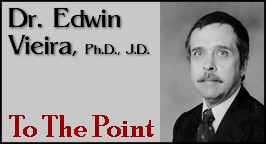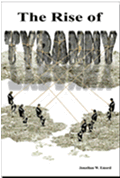TRIPPING UP THE TSA
By
Dr. Edwin Vieira, Jr., Ph.D., J.D.
June 28, 2011
NewsWithViews.com
It seems as if every day someone posts on the Internet a new video documenting the ever-escalating level of oppressive police-state behavior from the TSA. In many of these instances, TSA officials explicitly are heard making the claim that, because flying on a commercial air carrier is supposedly a “privilege”, rather than a “right”, passengers can be required to surrender their constitutional rights under the Fourth Amendment (and, presumably, under all other provisions of the Constitution as well) in order to be allowed to enter the supposedly “secured” areas of a terminal or to board a flight. Passengers are told that they have no justifiable complaint against the ill treatment they receive at the blue-gloved hands of the Blueshirts, because by entering the terminal they have implicitly agreed to “conditions” that are imposed on all airline travelers. This rationalization has been put forward on numerous occasions by various higher-ups in the TSA, and by their apologists in the big media, as well.
Unfortunately, as with most pronouncements on constitutional matters emanating from public officials and their shills these days, this claim is more than simply lame. It is an affront to the intelligence of every American.
The Supreme Court has long enforced the general rule that officials may not constitutionally condition the grant of any benefit to a particular individual on a requirement that would be unconstitutional if imposed promiscuously on the general public. E.g., Branti v. Finkel, 445 U.S. 507, 513-516 (1980); Perry v. Sindermann, 408 U.S. 593, 597 (1972); Graham v. Richardson, 403 U.S. 365, 374-375 (1971); Shapiro v. Thompson, 394 U.S. 618, 627 note 6 (1969); Pickering v. Board of Education, 391 U.S. 563, 568 (1968); Keyishian v. Board of Regents, 385 U.S. 589, 605-606 (1967); Elfbrandt v. Russell, 384 U.S. 11, 17-18 (1966); Baggett v. Bullitt, 377 U.S. 360, 379-380 (1964); Sherbert v. Verner, 374 U.S. 398, 404-406 (1963); Cramp v. Board of Public Instruction, 368 U.S. 278, 288 (1961); Torcaso v. Watkins, 367 U.S. 488, 495-496 (1961); Shelton v. Tucker, 364 U.S. 479, 485-486 (1960); Speiser v. Randall, 357 U.S. 513, 518-519 (1958): Slochower v. Board of Higher Education, 350 U.S. 551, 559 (1956); Wieman v. Updegraff, 344 U.S. 183, 192 (1952); American Communications Association v. Douds, 339 U.S. 382, 390 (1950); Hannegan v. Esquire, Inc., 327 U.S. 146, 155-156 (1946); West Virginia State Board of Education v. Barnette, 319 U.S. 624, 630-631 (1943).
This rule applies irrespective of whether the benefit at issue can properly be labeled a “right” or a “privilege”. E.g., Board of Regents v. Roth, 408 U.S. 564, 571 & note 9 (1972); Bell v. Burson, 402 U.S. 535, 539 (1971).
(Doubtlessly, any good legal researcher can add numerous other citations to these lists.)
So,
assuming for the purpose of argument that travel by commercial airliner
is a “privilege” rather than a “right”, such
travel can nonetheless not be conditioned on any requirement that would
be unconstitutional if imposed directly on the proverbial “man
in the street”. Now, perforce of the Fourth Amendment, a “man
in the street” cannot be subjected to any “unreasonable
searches and seizures”. Rather, as a prerequisite for any “place
to be searched” or “persons or things to be seized”
in a constitutionally reasonable manner, a “Warrant[
] shall issue, * * * upon probable cause, supported by Oath or Affirmation”.
Yet, as everyone knows, the TSA does not apply for “Warrants”
before the Blueshirts engage in their low-handed searches—no doubt
because the agency could never obtain
a “Warrant[ ] * * * upon probable cause” except in the most
extraordinary situation.
To use the fashionable judicial mumbo jumbo, it is “clearly established” that what the TSA is doing would unquestionably violate the Fourth Amendment if it were done to “the man in the street”. It is also “clearly established” that the TSA cannot constitutionally condition anyone’s supposed “privilege” to travel by commercial airline on the traveler’s waiver, surrender, or forfeiture of his rights under the Fourth Amendment. Therefore, every Blueshirt who coerces any traveler into submitting to an unconstitutional search or seizure has violated that traveler’s “clearly established” constitutional rights—and, as a consequence, (i) is personally liable in his individual capacity for monetary damages, and (ii) cannot raise the defense of “qualified official immunity”, because that defense applies only when the rights at issue are not “clearly established”.
So perhaps justifiably disgruntled victims of the Blueshirts’ oppression should engage experienced and hard-bitten civil-rights litigators to sue—not the TSA as an agency—but instead the Blueshirts and their supervisors, as individuals, in order impose directly on them, as individuals, the full costs of their misbehavior, relying on an “implied cause of action” directly under the Fourth Amendment. See, e.g., Bivens v. Six Unknown Named Agents of Federal Bureau of Narcotics, 403 U.S. 388 (1971). Success in such litigation will seriously impact the TSA, too. For no tyrannical regime can long exist if its myrmidons are made to pay, as individuals, for the egregious effects of the regime’s evil policies. Once the enforcers desert in droves, or are deterred from performing dirty deeds, or must “pay the piper” out of their own personal financial resources, the regime must soon collapse.
To be sure, some (perhaps many) “judges” may attempt to whitewash the Blueshirts’ oppressive behavior. This likelihood constitutes a practical objection to any strategy for correcting the TSA’s abuses through litigation. For no one who studies, let alone has to deal with, contemporary American “courts” should be unaware that judicial decisions and the Constitution are all too often quite different from each other, to the point of being mutually antagonistic—and that, in a case involving really serious constitutional challenges to the Establishment, the first order of business for people who have a grasp of practical political reality should often be a motion for change of venue to Sydney, Australia, where at least a geographically proper Kangaroo Kourt could be convened.
| Subscribe to the NewsWithViews Daily News Alerts! |
Yet, on the bright side, overt obstructionism by “judges” in favor of the burgeoning national para-military police state can only draw the entire judiciary’s credibility and even legitimacy into question—for which the “judges” have no answer that any thinking American will accept. And the sooner the last vestige of credence is stripped from rogue jurists, the sooner Americans will realize what other steps need to be taken to bring this situation under control.
Related Articles:
1- TSA requires a 95-year-old woman in Wheelchair to remove diaper











 Share
This Article
Share
This Article







